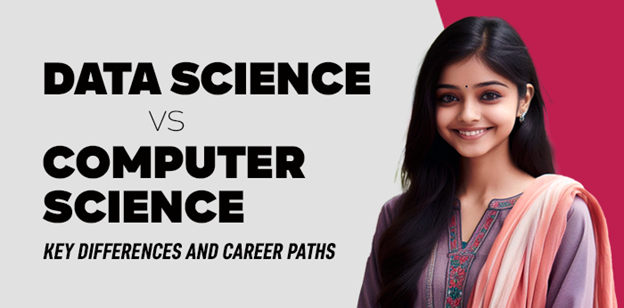
Step inside the fascinating world of technology and data! This comprehensive manual examines data science and computer science, two in-demand fields that unleash the potential of data. We will go over each, pointing out key differences and surprising similarities so you can make an informed decision about your future career path. Both data science and computer science provide intriguing career prospects and significant promise, with data scientists using their analytical methods and computer scientists using their engineering knowledge. Your choice will assist you in shaping the future and converting data into knowledge!
Join 100% Online Degree programs UGC Entitled and Affordable
The practice of gaining knowledge from data is known as data science. Consider it to be a form of alchemy; rather than transforming lead into gold, you transform data into revelations that are of great value. The data scientists of the digital age are the detectives of the digital age. They unravel mysteries that are hidden within massive volumes by utilising statistical analysis, programming, and machine learning. They have the ability to tailor your experience on the internet, create predictions about future trends, and even revolutionise healthcare. Data science may be the key to unlocking the potential of the mysteries that are contained within data, provided that you have an interest in exploring these secrets.
Computer science is an intriguing field of study that explores both the theory and application of computation. It encompasses everything, from the development of user-friendly software that we interact with on a daily basis to the construct of complex algorithms that are responsible for running our devices. Computer scientists are the builders of the digital age. They employ mathematics, logic, and programming languages to create innovative systems, find solutions to real problems, and unleash the potential of technology.
Amrita AHEAD, Amrita Vishwa Vidyapeetham provides both bachelor’s and master’s degrees in Computer Science. In Master of Computer Application (MCA), Amrita AHEAD offers the following specializations:
Data science and computer science dominate large data. Both innovate, but differently. Data science investigates and informs. Computer science designs its systems. This essay will discuss their methods, skills, and career options to help you pick data-driven.
|
Aspect |
Data Science |
Computer Science |
|
Focus |
Extracting knowledge from data |
Building software systems |
|
Approach |
Exploratory and analytical |
Engineering-oriented |
|
Skillset |
Statistics, probability, machine learning |
Programming languages, algorithms |
|
Tools |
Python (pandas, NumPy), R, Tableau |
Java, Python, C++, IDEs |
|
Career Paths |
Data Scientist, Machine Learning Engineer, Business Analyst |
Software Engineer, Web Developer, Systems Engineer |
|
Education Paths |
Statistics, Mathematics, Computer Science (with electives in data science) |
Computer Science, Mathematics |
Data science and computer science are two subjects that stand out in the modern world, driven by statistical data. Even though both are essential for developing new technologies, they serve different functions.
Focus: Insights vs. Systems:
Methodologies: Exploration vs. Engineering
Skillsets: Statistical Knowledge vs. Algorithmic Skills
Tools: Finding Info vs. Programming
Data Science:
Data scientists are knowledge age rock stars. They can filter vast volumes of data for knowledge using programming, machine learning, and statistics. Here is a view of some likely career prospects:
Computer Science:
Computer scientists are the architects of the digital world. They design, develop, and implement software systems that power everything from smartphones to complex enterprise applications. Here are some exciting career options:
There are many job roles related to Data Science and Computer Science. Here is a list of some of the job roles:
|
Field |
Job Role |
Average Salary (Lakhs per Annum) |
Description |
|
Data Science |
Data Scientist |
15-25+ |
Design and implement machine learning models, analyze data, translate insights into actionable recommendations. |
|
Data Science |
Machine Learning Engineer |
18-30+ |
Bridge data science and software engineering, build and deploy machine learning models at scale. |
|
Data Science |
Business Intelligence Analyst |
12-20 |
Translate complex data analysis into clear reports and dashboards, inform strategic decision-making. |
|
Computer Science |
Software Engineer |
10-25+ |
Design, write, test, and maintain software applications, ensuring functionality, efficiency, and security. |
|
Computer Science |
Web Developer |
8-20+ |
Build user-friendly websites and interactive web interfaces. |
|
Computer Science |
Systems Engineer |
10-22+ |
Maintain computer systems and networks, troubleshoot problems, implement security measures. |
To sum up, in the data-driven world data science and computer science play various functions. By means of statistical analysis and machine learning, data scientists examine and address issues. But computer scientists design computer languages and build software systems. Though in separate fields, both jobs depend on analysis, coding, and problem-solving. Their complementary nature helps them to collaborate and accomplish outstanding results, therefore encouraging technical innovation. Whether your passion is data analysis or software development, knowing these professions will enable you to select a job that fits your interests and successful outcome. Amrita AHEAD, Amrita University provides both Bachelor’s and Master’s courses
You May Also Like: